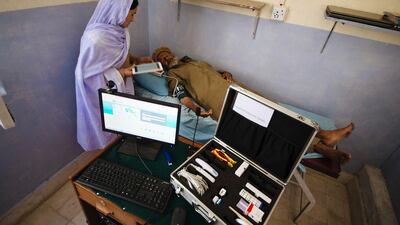It looks a bit like an alien visitor from another planet. Three spindly legs and an antenna pointing towards the stars. But the device, which uses a service provided by Yahsat, the Abu Dhabi based satellite communications company, will supply high-quality, high-speed internet to places where previously even a mobile phone signal was a challenge.
In fact, for communities in some of the world’s poorest and most remote places, its arrival opens up a lifeline to the 21st century. It means better education, healthcare and opportunities that were previously unthinkable.
In the early hours of January 26, UAE time, Al Yah 3 will be perched on top of commercial rocket in French Guiana and blasted into orbit. It is the next step forward for Yahsat, the Abu Dhabi-based satellite communications company that already operates two satellites.
The satellite will enable tens of millions of extra people in Brazil and Africa to be covered by the company’s services, which include YahClick broadband, as well as entertainment TV channels and inflight internet.

By early summer, the company plans to offer internet coverage to 190 million people in Brazil and take the number of African countries it provides services to from 19 to 28, and a staggering 780,000 million people, or 65 per cent of the continent’s population.
It is little wonder that Farhad Khan, Yahsat’s chief commercial officer, describes the potential of new satellite as a “massive opportunity.” The company, wholly owned by Mubadala, the Government’s strategic investment company, already covers much of the Middle East, including Egypt and Saudi Arabia, as well as southern Africa, Pakistan and Afghanistan.
The opportunities for expansion in the new markets are two fold, according to Mr Khan. In Brazil, especially in rural areas, there are customers who could afford broadband internet, but are frustrated because the expense for the provider of putting in conventional fibre and copper wire networks means they are without the service.

In Africa, the current cost of broadband internet is too expensive for most individuals and makes it unattractive to providers as a commercial venture. Yahsat’s solution is to offer the equipment for satellite broadband to these communities that, in some cases, can start from as low as a couple of hundred dollars.
“Very few operators are going into areas where there are two or three hundred people in settlements because there is no return on investments for them,” Mr Khan says. “And that for us is the beauty of our satellite technologies.”
One solution is a partnership with Bluetown, a Danish company whose easily portable base station is powered by solar panels and rechargeable batteries, creating wifi hotspots through YahClick in small and remote communities. The lower cost makes them attractive to government and NGO agencies working in Africa and the developing world.
Access to the internet in such places can be dramatic and life changing in sometimes unexpected ways. In the Western Cape province of South Africa, government officials estimated there were perhaps 1.5 million people entitled to state benefits who were not receiving them. With access to Yahsat’s satellite signal, and using portable equipment, officials set out to track them down.
“We made it possible for [officials] to go to the most remote areas and send biographic and biometric information taken from the citizens to the central processing bureau,” Mr Khan said.
“They then identified which of these people were eligible and we starting to ensure that people who were eligible for pensions are now being paid.”
In Pakistan, another partnership with the Interactive Group has brought healthcare to villagers in communities that are sometimes cut off for months on end during the winter months.
Doctors carrying portable diagnostic equipment sometimes trek for many hours to reach them. But because the villages are now under the Yahsat satellite footprint, the doctors are then able to send the raw data from everything from blood tests to ECG scans to specialists, often many hundreds of miles away, and get back results, sometimes in minutes.
Similar services have been made available to the Maasai of Kenya, while the Nigerian government is working to identify local partners who can use Yahsat to offer low-cost internet in poorer areas. At the other end of the market, the company can offer fast broadband to safari camps and game lodges to meet the expectations of high-end customers.
Once Al Yah 3 is in orbit, Yahsat expects to begin offering its new customers services by June. All of this depends, of course, on a successful launch this month. Yet at the back of everybody’s mind, no doubt, are incidents like the launch pad explosion of a Space X rocket in 2016, which destroyed a US$200 million communications satellite Facebook had hoped to use to provide expanded internet access to Africa.
Mr Khan said the Yahsat team have “tested, retested and tested again. But ultimately it is in God’s hands.”
“We have a saying in the region: ‘Trust in God, but tie your camel.’ Right now we are busy tying our camel.”
___________
Read more:
Yahsat to target low-cost carriers, e-commerce firms for in-flight Wi-Fi


